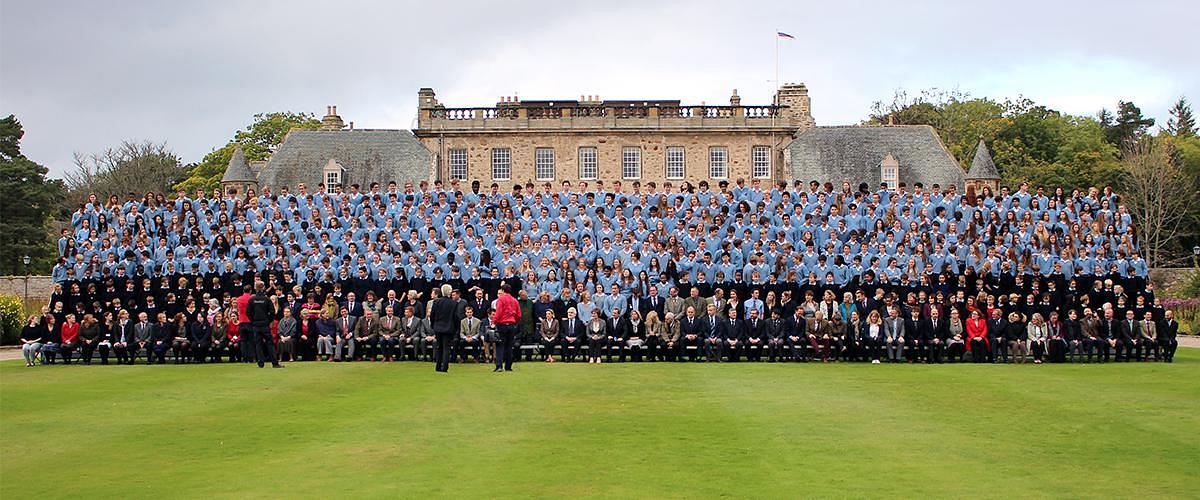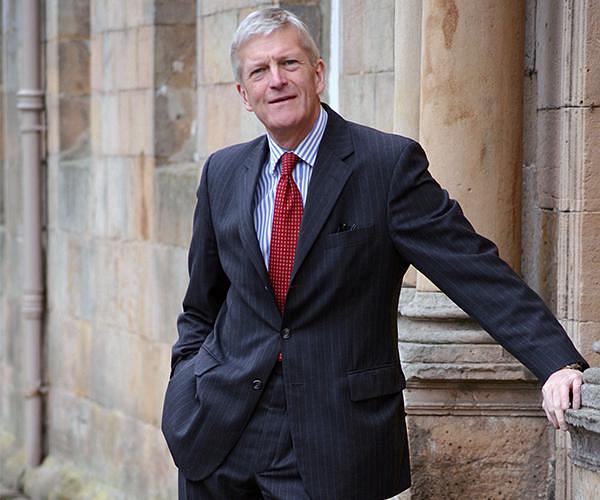What our Founder thinks of Gordonstoun today.
What our founder might think of Gordonstoun today
By Mark Pyper, former Gordonstoun Principal (1990-2011)

While sharing the positive feelings of pride, pleasure and admiration felt by so many supporters of Gordonstoun on reading the Edinburgh University research on The Lifelong Value of Out-of-Classroom Learning Experiences, I found myself wondering what our founder, Kurt Hahn, would have made of this significant document.

I am sure that first he would have been impressed by the professional nature of the research. During the Second World War Hahn was doing various things for the British government and he became convinced that, when merchant shipping vessels were sunk, survival time in the water was to a large extent age dependant, with the older sailors outliving their younger counterparts. Rather than rely on anecdote and oral tradition, Hahn conducted a scientific survey which proved his point. Training methods for recruits were changed accordingly and the Sea Schools at Burghead and Aberdovey were born.
Kurt Hahn would also have approved of the background to the recent research, keen to underline the virtues and advantages of genuinely holistic education, valuing the balanced Platonic view above the ultra-cerebral Ionian and the uncompromisingly tough Spartan versions. He wrote ' Our educational system is chiefly concerned with the transmission of knowledge and accepts no responsibility for the training of character'. When pressed on what he saw as the objectives of a good education, Hahn replied 'The foremost task of education is to ensure the survival of these qualities: an enterprising curiosity; tenacity in pursuit; readiness for sensible self-denial; and above all, compassion'. Of course he said a great deal else about the purpose of education and the role it should play in countering the ills of society.
Kurt Hahn might have agreed that, while the building, training and development of character is all-important, and while this happens all the time - in class, in Houses, in chapel, in the refectory - nevertheless the real touchstone is to be found in those experiences which are different, special and frequently unexpected. 'It is the sin of the soul' he said 'to force young people into opinions but it is culpable neglect not to impel young people into experiences'. Education for him was a means to an end, not an end in itself; I think he would have believed that in contemporary education too much emphasis is placed on outcomes rather than the process itself, 'We want to develop people through jumping, not make jumpers out of people'. This precious education was for life, not just for the next immediate stage, so judge it ten years later rather than tomorrow as you look beyond the school gates, 'The Gordonstoun community is on active service for things which are more important than Gordonstoun'. So gear your education not to satisfy the whims of those involved but to what society needs and you will eventually and inevitably gain true fulfilment and reward.
And what might Hahn say about some of these essential elements, starting with internationalism? Without doubt he would have approved of the aspiration of every student developing a global awareness and an international perspective. Having attended the Treaty of Versailles in 1919, he was totally committed to harmony between the countries of Europe and this was reflected in the style of education at both Salem and Gordonstoun.
Challenge to Kurt Hahn was not just about bravery in the face of a conventional enemy; tedious training could be equally demanding, 'He who trains and drills accepts boredom, exhaustion and danger, all to be ready to help his fellow men'. The impact of achievement should be on oneself not gaining ascendancy over another: 'Mountaineering and seamanship are conquests without the humiliation of the conquered.' The challenge of achieving balance is also important. Hahn talked about turning the bookworm 'inside out' and the hearty games player 'outside in'. Dance gets a mention in the report and this was the real reason for introducing dance as a compulsory subject for all Year 9 students in the mid 1990s. It was not a matter of providing more opportunities for performing arts enthusiasts; it was much more a drive to ensure that those who took apparently muscular activities in their stride should experience something alien to their normal occupations.
Kurt Hahn would have approved of the modern Gordonstoun students still being given responsibility to run their own lives and influence the lives of others, accepting that external pressures and expectations render this objective more difficult than it used to be. He was characteristically outspoken about this: 'Let responsible boys and girls shoulder duties big enough, when negligently performed, to wreck a state.' That sense of unexpected responsibility, for instance as Watch Leader on Ocean Spirit, comes across strongly in the report and is hugely valuable.
And so to the concept and practice of service, in many ways the cornerstone of Hahnian education. The young should believe that they are always needed; that no-one can do everything but that everyone can do something. I remember talking to John Hamilton, former Director of Studies at Gordonstoun and a most accomplished expert in all aspects of overseas projects. I was congratulating him on the real benefits which his Thailand projects brought to the Karen people in the north-west part of that country. John corrected me firmly, telling me that, while such benefit might ensue, this was not the reason for his involvement in these activities and that the education and training of the students in his charge in the appreciation of need leading to compassionate action was what it was all about. Hahn agreed. 'It is the supreme task of educators to help the young achieve a balance of power in their inner life so that the love of fellow human beings can take charge'.
Which brought us back to the teachers and Kurt Hahn noting from the report that the current staff, in common with their predecessors, are remarkably talented and supremely committed to delivering a special brand of education to which they fully subscribe. And that is just as well: 'If it is true that education can heal the state, then we educators have a grave and anxious responsibility'. We agreed that nevertheless, in the modern age, it is a real challenge to deliver this all embracing curriculum beyond the classroom and to ensure they simultaneously achieve the academic results they want and need and are expected of them. The answer lies first in the aeons and acres of time that are available in a full boarding school if the planning is right. Secondly, both Kurt Hahn and I saw countless examples of young people, stimulated by the experiences beyond the classroom, applying themselves with added zest and enthusiasm to their academic studies.
I asked Kurt Hahn what he did not see represented in the survey report and he had two observations. The first was an absence of a mention of the grande passion which had been a hallmark of Gordonstoun in its early years - the expectation that every student would pursue one interest to a remarkably high level. Perhaps increasing breadth has rendered that particularly difficult in the modern age. Then there is the pursuit of the solitary existence; like Simon and Garfunkel, listening for the sound of silence; as direct as ever from KH 'Neither love of man nor the love of God can take a deep root in a child that does not know aloneness'. We agreed to leave that one for the School to think about.
We ended on a positive note with the thought - the very important thought - that Gordonstoun, with its remarkably balanced and formative curriculum and its energising environment, was and remains a school for all comers. 'Education should attempt to break down the stereo types within society' were Hahn's last words on this most important and useful report. I reassured him that he would find in the school both genders, a very large number of nationalities, young people from a wide range of social backgrounds with varying levels of academic ability and other skills, held in equal esteem; a genuinely comprehensive school and what a lasting contribution its members can make to the benefit of their communities and society in general.